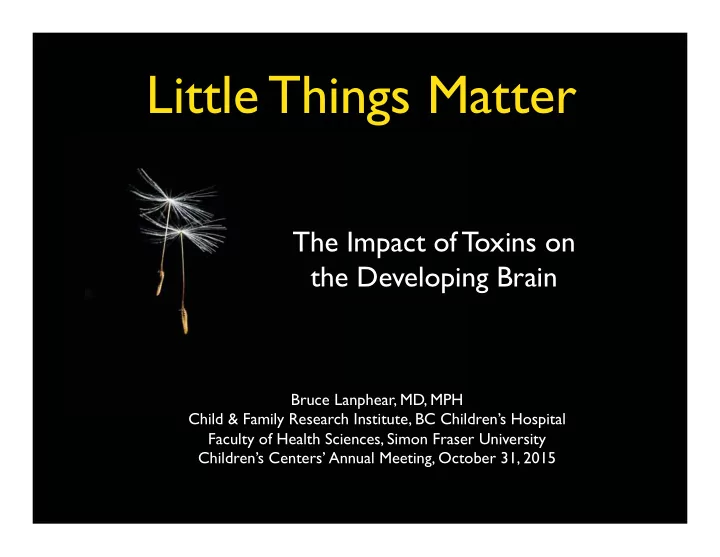

Little Things Matter The Impact of Toxins on the Developing Brain Bruce Lanphear, MD, MPH Child & Family Research Institute, BC Children’s Hospital Faculty of Health Sciences, Simon Fraser University Children’s Centers’ Annual Meeting, October 31, 2015
Brain-based Disorders in Children Prevalence Merikangas KR, He JP , Brody D, et al. Prevalence and treatment of mental disorders among US children in the 2001-2004 NHANES. Pediatrics 2010;125:75-81. Centers for Disease Control and Prevention. Prevalence of autism spectrum disorders, United States, 2008. MMWR Surveill Summ 2012; 61:1-19. Boyle CA, Boulet S, Schieve LA, et al. Trends in the prevalence of developmental disabilities in US children, 1997-2008. Pediatrics 2011;127:1034-1042.
The Rise of Autism Weintraub K. Nature 2011;479:22-24.
Factors that Impact Brain Development • Sex • Nutrition • Preterm Birth • Social Stressors • Built Environment • Maternal Depression • Genetic Susceptibility • Preschool Attendance • Environmental Toxins
$1billion US Expenditures on Autism Research $40 million Genes Environment Weintraub K. Nature 2011;479:22-24.
Genes or Environment? Genes Environment
Genes or Environment? Genes and Genes Environment Environment Rett � s Autism TBI Syndrome ADHD Depression
Genes or Environment? Genes and Genes Environment Environment COMPLEX Rett � s Autism TBI Syndrome ADHD Depression
“ If causes can be removed, then susceptibility ceases to matter. � Geoffrey Rose, MD
Environmental Disasters
… are just the tip of the iceberg
Vulnerability of the Developing Brain • The blood brain barrier isn’t fully formed; it is more permeable to toxins • Rapidly growing cells are often more vulnerable to toxins than slowly growing cells • Brain growth occurs over a longer duration than other organs • The fetus and child may lack enzymes to detoxify contaminants • Young children often more heavily exposed to contaminants than older children and adults
Cardiovascular Disease Mortality by Cigarette Smoke (PM 2.5 ) Pope CA, et al. Circulation. 2009;120:941-948. (IHD=gray, CVD=dark gray and CPD=black)
Benzene and Leukemia Vlaanderen J, et al. Env Health Perspect 2010;118:526-532.
Tobacco Exposure and Birthweight England, L. J. et al. Am. J. Epidemiol. 2001 153:954-960; doi:10.1093/aje/153.10.954
���������
��������� ����������������� Mackay DF, et al. PLoS Medicine 2012: e1001175. doi:10.1371/journal.pmed.1001175
Impact of Lead on PTB OR=1.9 Taylor CM, et al. BJOG 2014; DOI 10.1111/1471-0528.12756
��������
����������� ���������� ������������������������������������������
The Prevention Paradox The majority of disease and disability occurs in those who are at low to moderate risk
The Prevention Paradox
High Risk Low-Risk
$1= $17 to $220 Gould E. EHP 2009;117:1162-1167.
What is the cost- benefit ratio for childhood vaccines?
$1= $16.5 Zhou F, et al. APAM EHP 2005;159:1136-1144.
Cost Saving Preventive Interventions $46% 16% 13% Environmental Clinical Non-clinical person-directed Chokshi DA, et al. NEJM 2012;367:295-297.
Time to Give Prevention a Chance?
Lessons from the FDA
If we didn’t evolve with it … avoid it.
How to Avoid Exposures to Toxins • Eat fresh, organic and unpackaged foods; avoid canned foods • Minimize use of pesticides around the home • Avoid cosmetics, fingernail polish and lotions • Support bans on smoking in public places and cosmetic pesticides • Support efforts to update chemical management policies and reduce industrial pollutants
Organic to Conventional Yield Ratios Seufert V, et al. Nature 2012:485:229.
“We can’t live in a state of perpetual doubt, so we make up the best story possible and we live as if the story were true.” Daniel Kahneman
Recommend
More recommend